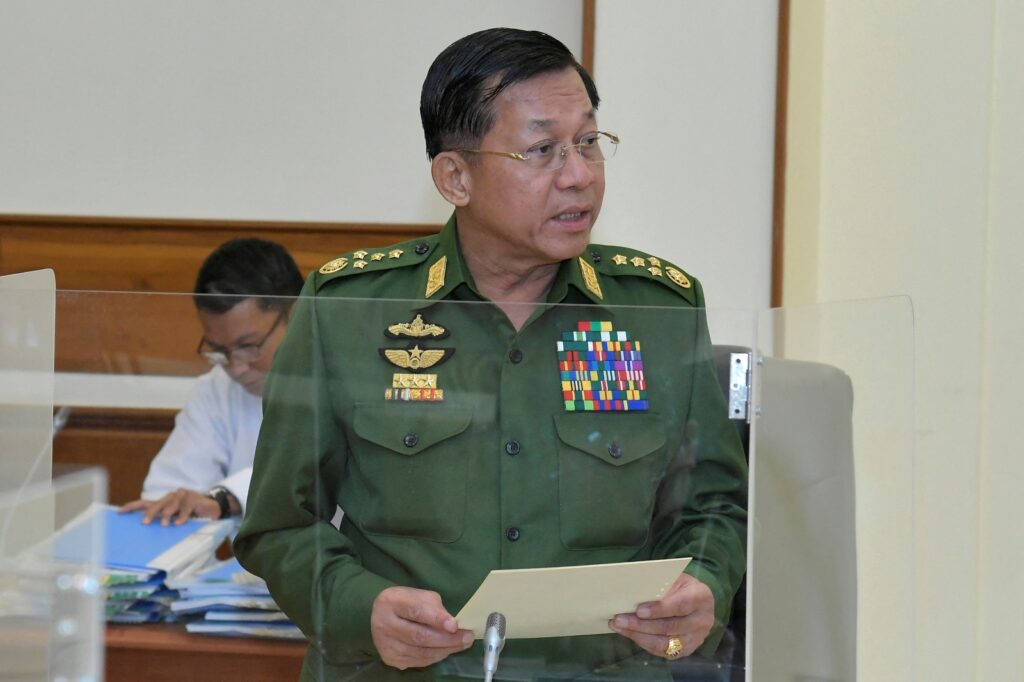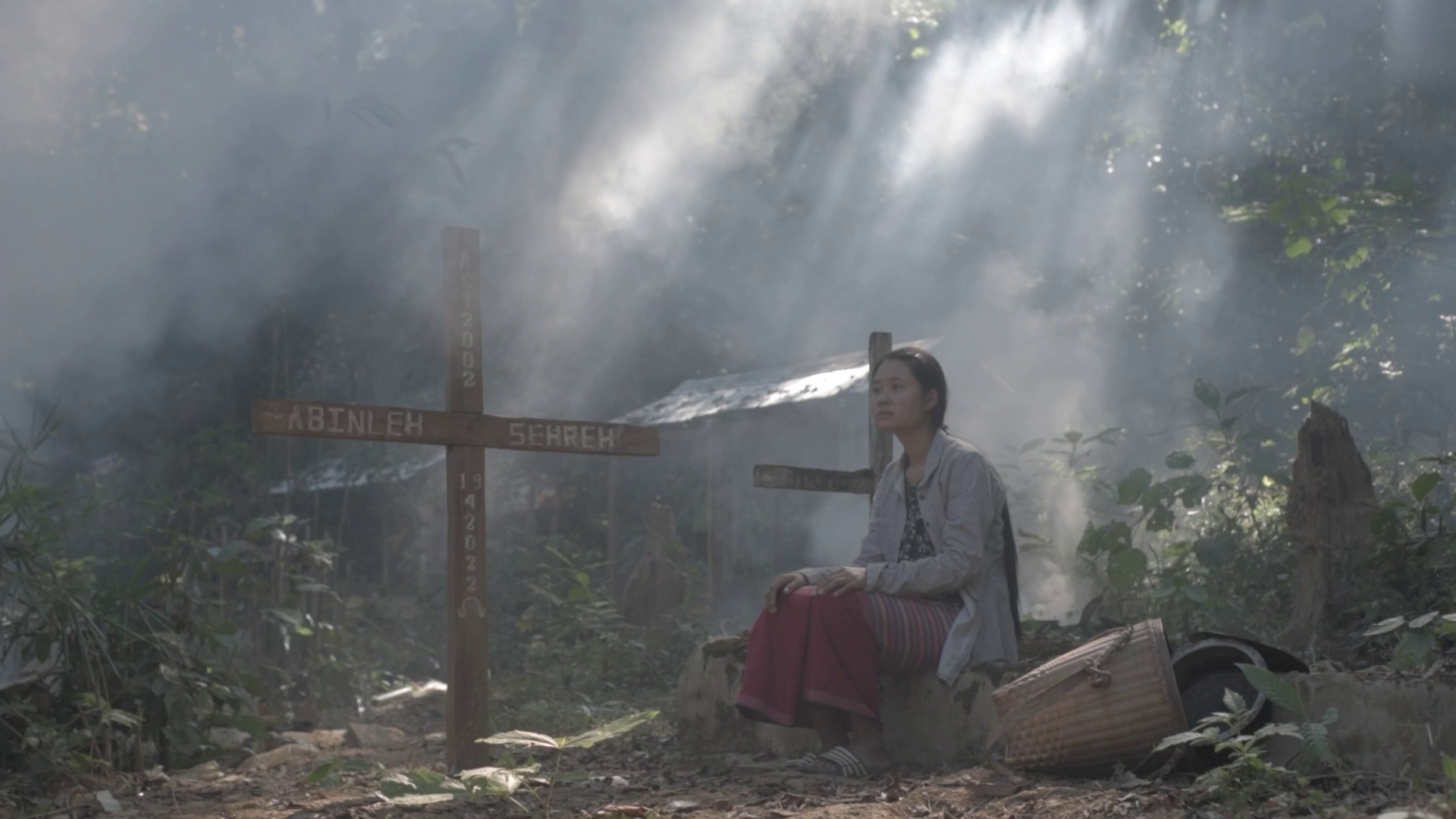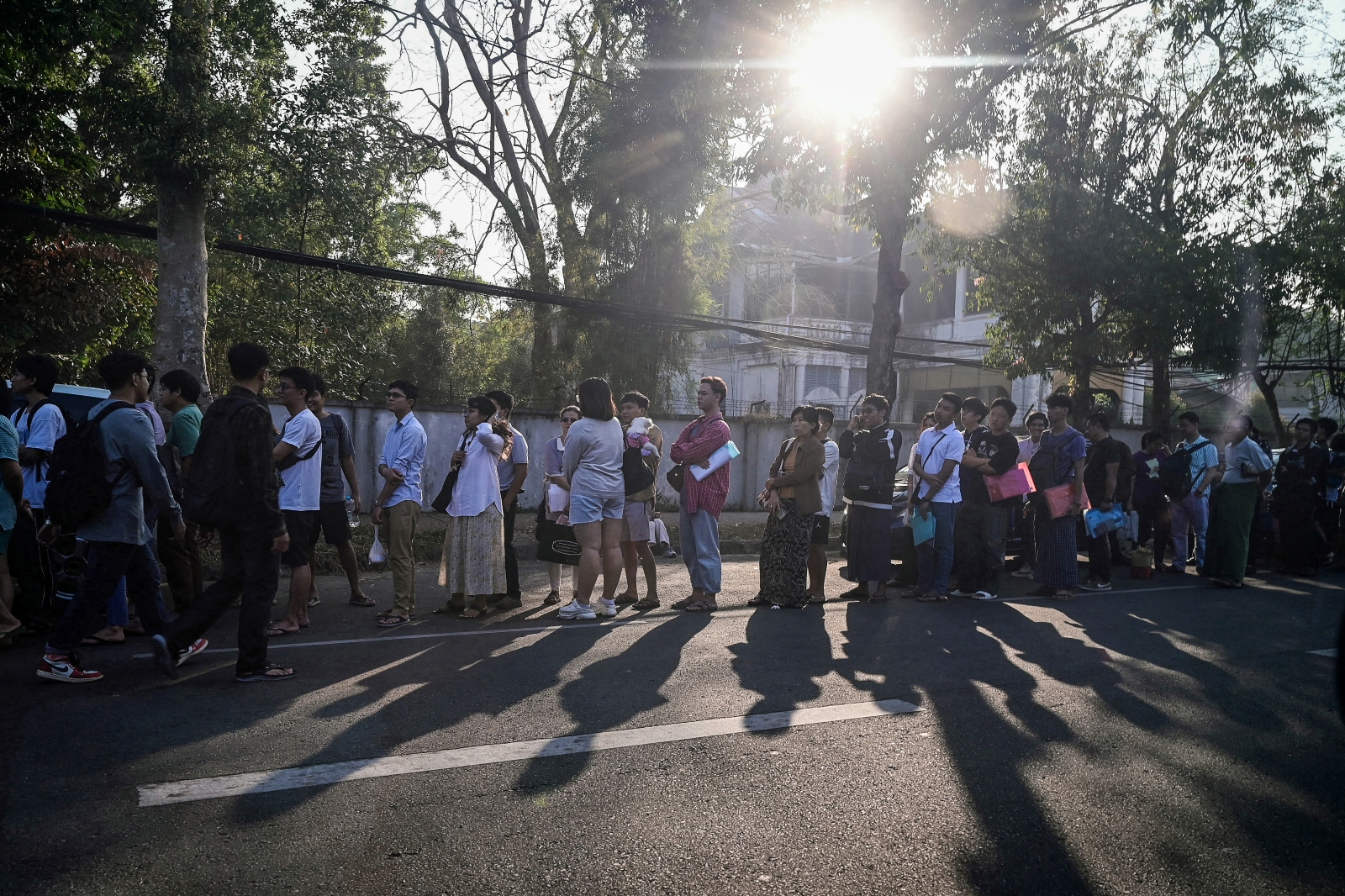With the Myanmar military suffering unprecedented losses on the battlefield, regime leader Min Aung Hlaing is finding himself on increasingly shaky ground as discontent rises up the ranks.
By FRONTIER
When the Three Brotherhood Alliance of ethnic armed groups launched Operation 1027 in late October, the Myanmar military crumbled across northern Shan State, leading many to believe the junta that seized power in a 2021 coup was on its last legs.
In recent weeks, expectations have been tempered, as the junta manages to cling on despite being severely weakened. But another threat to regime leader Senior General Min Aung Hlaing might be brewing off the battlefield.
“He is the worst leader in the history of the military and the country. His leadership destroys the dignity of our military,” said a major-general in the air force, who spoke on the condition of anonymity.
Senior officers told Frontier the humiliating defeats across northern Shan have shocked the military establishment. Brotherhood members the Myanmar National Democratic Alliance Army and Ta’ang National Liberation Army have seized more than a dozen major towns and border crossings with China. Their ally, the Arakan Army, has claimed control of Paletwa Township in southern Chin State, while fighting continues to rage in neighbouring Rakhine State.
In addition to the routs on the battlefield, there’s anger over the administration’s timid response to China. Many believe Beijing greenlit Operation 1027 to crack down on the cyber scam industry in Shan, which often targets internet users in China and uses other Chinese nationals as forced labour, and was linked to the military-aligned Kokang Border Guard Force. The major-general said he and other generals expected Min Aung Hlaing to publicly blame China for what he termed a “foreign invasion”, and to summon and admonish the ambassador.
Instead, a handful of military supporters staged a meek protest outside the Chinese embassy in Yangon on November 19, which the major-general said fell far short of the necessary response.
“His supporters organised that protest,” the major-general said, claiming it was arranged by a faction of the pro-military Union Solidarity and Development Party that is loyal to Min Aung Hlaing. “I refer to his supporters, not military supporters.”
This month, Beijing helped broker a ceasefire between the Brotherhood and junta, but it seemingly only applies to northern Shan, with the AA actually stepping up its offensive in Rakhine and southern Chin.
An army major said he met with a member of the State Administration Council, the junta’s inner circle, during the last week of November. He asked how the military would respond to Operation 1027, but the SAC member said Min Aung Hlaing has no choice but to pursue political dialogue over a counter-offensive.
“He said we have to be careful because China might be behind the Three Brotherhood and the SAC doesn’t want to make trouble with China,” he said.
The major said he has participated in high-level strategic meetings about the military response to Operation 1027, but Min Aung Hlaing has not been personally attending those sessions.
“I think that the commander-in-chief has a plan to make the country peaceful, but he needs to do it as soon as possible. Otherwise, all townships may be occupied by the rebels,” he said.
He warned that other members of the military are running out of patience.
“We have to give the commander-in-chief time to deal with the current crisis. But if he fails, everyone will hear some breaking news within two months. I’m saying the end of February. I think that’s enough time,” he said, speaking to Frontier late last year.
Both the army major and the air force major-general identified the prospective loss of Lashio as a red line that could doom Min Aung Hlaing. The largest town in northern Shan, Lashio hosts an air base and the Northeastern Command headquarters, and is now surrounded by the TNLA.
A ‘historic shame’
The military is also besieged in cyber space. Regime spokesperson Major-General Zaw Min Tun is increasingly being trotted out to downplay military losses, often while lashing out at outlets seen as pro-resistance, like Khit Thit Media, or linked to Western governments, like Voice of America or Radio Free Asia.
“They cannot afford to remain silent,” political analyst and former military officer Dr Aung Myo said of this approach. “The absence of official statements tends to fuel rumours and heighten public concerns. Consequently, the junta sees the media sector as crucial, both for motivation and the dissemination of accurate information.”
But increasingly, the regime’s overtures are falling on deaf ears.
A woman who has worked as a distributor for the state-run Myanma Alin newspaper in the military-dominated capital of Nay Pyi Taw for 10 years, said readership has steadily declined since the coup.
“After the political changes, regular citizens who used to pay monthly subscriptions have stopped buying it. The number of houses I have to deliver to has decreased,” she said, adding that most remaining customers are organisations that need the paper for work.
Immediately after the coup, the regime launched monthly press conferences overseen by Zaw Min Tun. But they were discontinued in November 2022, when two pro-military journalists asked sensitive questions and were subsequently arrested. Since then, Zaw Min Tun has largely given statements directly to regime media.
U Hla Swe, a former army lieutenant colonel and USDP lawmaker who publishes pro-military journal Bullet News, said the military isn’t doing enough to control the narrative.

“At times, I find myself frustrated with the SAC’s announcements,” he said, complaining that the regime takes too long to issue statements because it is meticulously verifying information, while pro-resistance media publishes news quickly “whether accurate or not”.
He added that Zaw Min Tun often appears unanimated and dull in his media appearances, which may give the public the perception he’s feeling downcast about the political situation.
While Hla Swe was cautious in his criticism, other pro-military commentators have not pulled their punches in recent weeks. YouTube personality Maung Maung explicitly called for Min Aung Hlaing to step down, calling him “incompetent” and slamming him for ushering in a period of “historic shame”. U Kyaw Soe Oo, editor of USDP-affiliated People Media, also slammed the regime. In a video posted to Facebook on January 8, he read out a list of major towns the military had lost since the start of Operation 1027.
“I’m a supporter of the Tatmadaw, not the commander-in-chief,” said a journalist at a pro-military media outlet, who told Frontier he is considering resigning from his job. “If we truly love the Tatmadaw, we must tell the people the truth. A lot of territory has been lost. The leadership must admit they lack management and administrative skills.”
Pro-military figures outside of the media are also turning on Min Aung Hlaing. At a protest on January 16 in the Mandalay Region hill town of Pyin Oo Lwin, home to the military’s premier training academies, ultranationalist monk Pauk Sayardaw called for the junta chief to step down as commander-in-chief in favour of his deputy, Vice Senior General Soe Win, while retaining a political role. “Isn’t he tired of dealing with both military and civilian issues?” the monk said of Min Aung Hlaing. “Give the commander-in-chief position to the deputy chief, and the current chief will only hold the position of prime minister.”
Hla Swe acknowledged that the military is struggling but still tried to defend Min Aung Hlaing. He said when the military successfully defeated a similar offensive launched by the MNDAA in northern Shan in 2015, the situation was very different.
“Back then, the rest of the country was relatively calm, so the government could consolidate its forces to repel those attacks,” he said. “Min Aung Hlaing’s situation now is different. He’s facing opposition unlike any experienced before.”
But others criticise the junta chief for letting the conflict spiral out of control this way. A retired army colonel told Frontier that it’s Min Aung Hlaing’s fault there’s fighting in Bamar-majority areas.
“I’ve never seen a situation like this before. The army is fighting across the entire country. Tanks and heavy weapons are being lost. The military is losing a shocking number of soldiers,” he said.
However, this discontent doesn’t mean military supporters are suddenly seeing the light and embracing democracy. Hla Swe called for the military to introduce mandatory conscription for three years or increase salaries to entice better servicemen, even at the expense of other government services.
“They should prioritise allocating more resources to soldiers and police officers, even if it means not increasing resources for other [government] departments,” he said. “Additionally, efforts should be made to ensure that those in the military are content, for instance by providing them with better-looking uniforms. Currently, even the uniforms are not as aesthetically pleasing as those worn by the rebels.”
A retired army major said Min Aung Hlaing and Soe Win might not even realise how upset military supporters are with their leadership. He said their inner circle is just telling them what they want to hear, particularly those dependent on the leaders for business opportunities and other personal benefits.
“It would be nice if someone cut down number 1 and number 2,” he said referring to Min Aung Hlaing and Soe Win. “But nobody will.”







